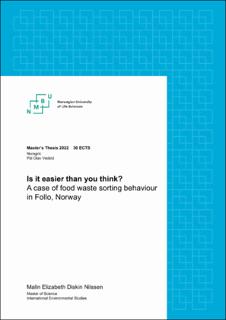| dc.description.abstract | The global environmental crisis demands that we ensure the reuse and recycling of materials already in existence. Recycling requires separate waste sorting by individuals. In Norway, 50 percent of food waste ends up in the residual waste, contaminating other wastes and hindering their potential recycling. After introducing a recycling system, information is the most common policy instrument utilized to influence waste sorting behaviour. A municipal waste management company in Norway, Follo Ren, administered a food waste sorting campaign which targeted three groups of the population identified as being less efficient at food waste sorting. The main objectives of this thesis are (i) to examine the impact of this information campaign and (ii) to explore whether citizens experience any situational barriers which hinder efficient food waste sorting behaviour. 19 respondents representing the three groups targeted through the campaign were interviewed in- depth using semi-structured interviews. Using theories of human action, power, and policy instruments, the findings shed light on how respondents reacted to information and the campaign and on how the identified barriers influence respondents’ motivations and willingness to participate in the sorting scheme. The findings suggest that although the system in Follo is good, citizens are hindered by various physical, motivational and situational barriers which ultimately enhance the perception of effort required to participate in the sorting scheme. While information is continuously requested, its tangible effects are questionable if not combined with other policy instruments. As such, Follo Ren is advised to continue providing information focusing on how to sort, as well as why sorting is beneficial, but to combine it with physical nudges addressing the various barriers experienced by citizens. Using nudging measures is likely to increase perceptions of convenience and accessibility by decreasing perceptions of personal cognitive, physical and time-related effort required. | en_US |

